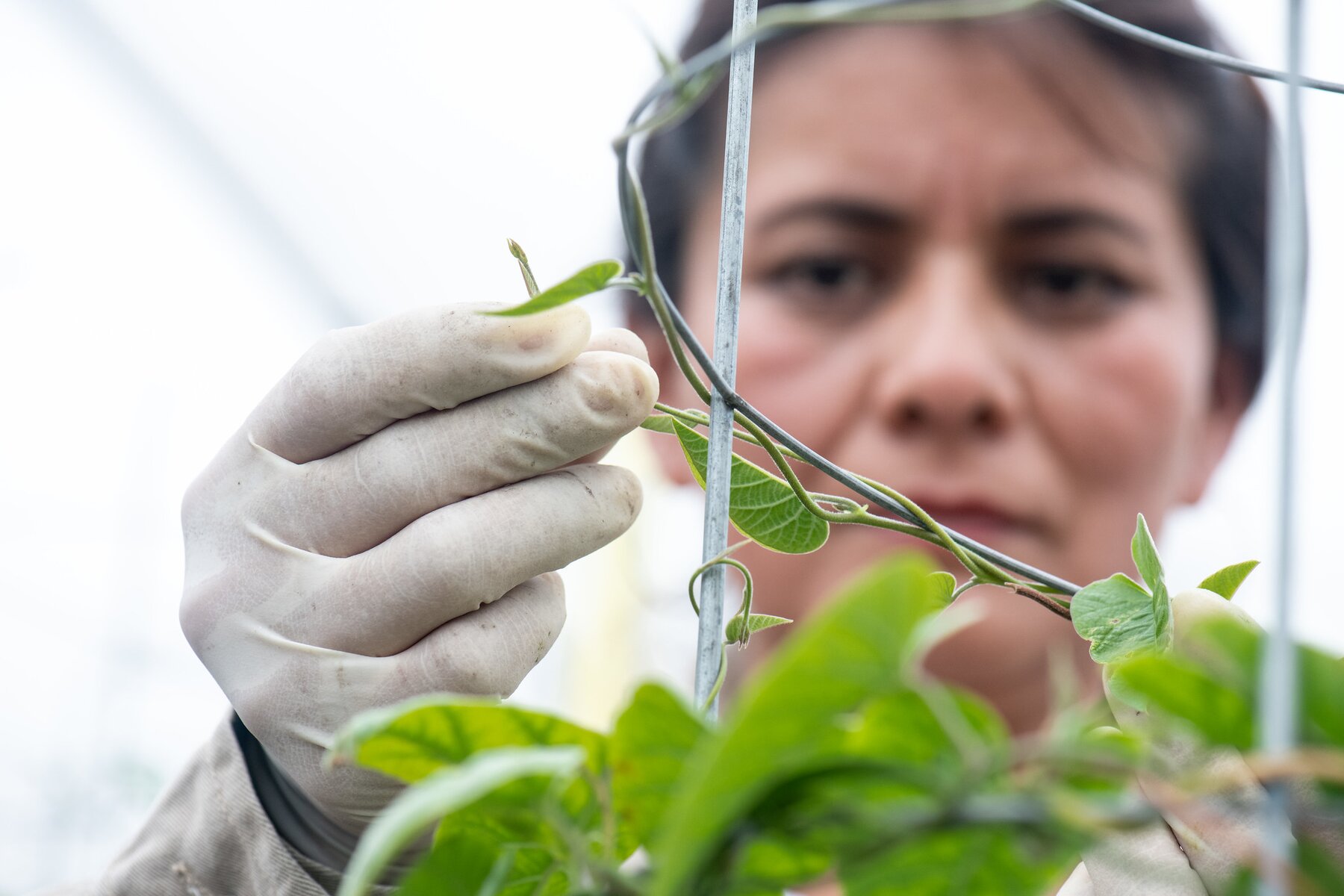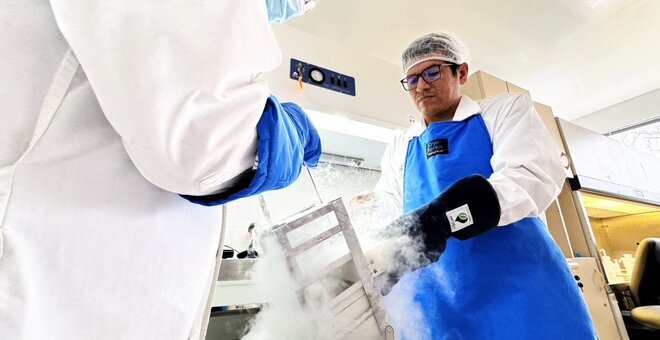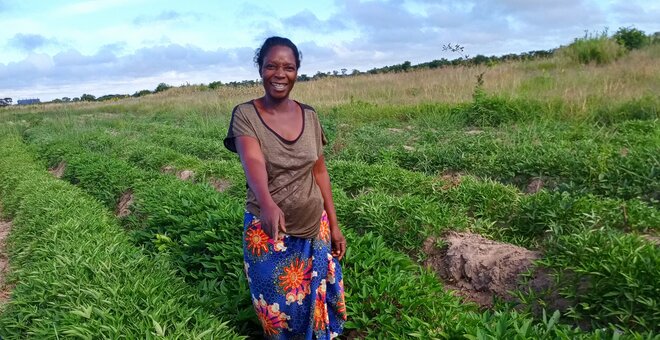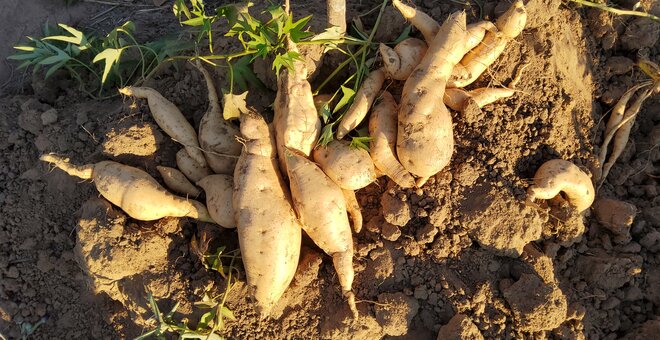The Sweetpotato Project
Start year: 2022
Sweetpotato is a nutritious staple across Africa, but its diversity is under threat. To safeguard it forever, partners of the Sweetpotato, a model for food security and long-term conservation of biodiversity project are coming together to test a model that could work not only for sweetpotato but also for other crops, which cannot be conserved as seeds.
Act Now or Lose Diversity Forever
Sweetpotato is rich both in energy and in micronutrients – offering a whole array of vitamins (A, C, B1, B2, B3 and B6) and minerals (copper, manganese, phosphorus and potassium). This makes it an important component of food security in many parts of the world. This unassuming root also boasts adaptive qualities for many farming systems: it is tolerant to drought and can regenerate after seemingly dying back.
Unfortunately, the diversity of sweetpotato is threatened in many countries.
While smallholder farmers continue to cultivate diverse traditional landraces, this precious diversity is in jeopardy because of the accumulation of diseases and pests, agricultural intensification, socioeconomic and environmental issues and climate change. In addition, the very places where sweetpotato diversity is meant to be kept safe – ex situ collections – face significant challenges.
Sweetpotato is propagated by cuttings rather than seeds, and its conservation relies on collections kept in the field or in vitro (plantlets in test tubes under controlled conditions). Both of these conservation measures are labor-intensive and risky. In order to safeguard sweetpotato diversity for the generations to come, a cheap, long-term back-up is urgently needed.
Chill Roots
The best option for conserving sweetpotato diversity for future generations is cryopreservation, which is a process where liquid nitrogen is used to store plant parts at an ultra-low temperature. At -196°C, all biological and chemical processes in the plant slow to a virtual stop. In theory, plant samples can be conserved for centuries this way, and when taken out can be revived and carefully grown into full plants.
In addition to it being safe and reliable, cryopreservation is cost-effective. Once a sample is prepared for cryopreservation, it costs a genebank only about US$2 a year to maintain one sample. Safeguarding that same sample in vitro costs up to US$60 a year.
Based on a feasibility study, a panel of experts has called for a global effort for the long-term secure cryopreservation of vulnerable collections of crops that are not conserved as seeds: the Global Plant Cryopreservation Initiative (GPCI).
The Sweetpotato Project is an example of the type of project that will be part of the Global Plant Cryopreservation Initiative. It was conceived in this light: to support the long-term, secure back-up of crop collections which cannot be backed-up in the Svalbard Global Seed Vault.
The Project
In 2022, the Crop Trust, together with the International Potato Center (CIP), the Zambia Agricultural Research Institute (ZARI) and Fiompiana Fambolena Malagasy Norvéziana (FIFAMANOR) in Madagascar, initiated the three-year project Sweetpotato, a model for food security and long-term conservation of biodiversity. This project is funded by the UK Government’s Darwin Initiative, CGIAR and the Crop Trust.
The project is piloting the ‘Clean & Share’ conservation approach for sweetpotato landraces that is at the heart of the GPCI. Partners will collect, clean of diseases, and process for cryopreservation unique sweetpotato landraces from Madagascar and Zambia. At the same time, they will return disease-free planting material of these landraces to smallholder farmers.
Vines collected from landraces in Madagascar and Zambia will initially be sent to CIP’s Kenya facility at the Kenya Plant Health Inspectorate Service (KEPHIS). Here, they will be cultured in vitro and cleaned of diseases using heat treatment and by isolating the growing shoot tips, after which they are usually free of viruses. The disease-free material will be sent back to the national partners to be grown out and made available to farmers. The landraces will also be sent to CIP’s main genebank in Peru for further screening and cryopreservation.
The project will incorporate the landraces from Madagascar and Zambia in the global collection of sweetpotato at CIP in Peru. This will ensure that the unique traits of these landraces will be made available under the International Treaty on Plant Genetic Resources for Food and Agriculture and are accessible to plant breeders and other researchers worldwide to breed climate-resilient and pest- and disease-resistant varieties.
The project brings relief to farmers and researchers because one of the biggest problems that farmers are having are low yields due to viral diseases, which are transmitted by planting material. Clean planting material from this project will enhance farmers' yields. This is great news as the demand for sweetpotatoes in Zambia has been increasing in many households. There are a lot of programs promoting diversified diets to ameliorate malnutrition, especially in children. The trend is going up and it may continue to do so. We need to be ready to provide sweetpotato diversity.
Sweetpotato is a significant food security crop in many parts of the world. Through this project, partners select landraces grown by farmers, clean this material of viruses and other pathogens that limit yields, conserve and multiply the cleaned materials and redistribute them back to farmers for planting. This project provides proof of concept for the “Clean & Share” approach to conserve and utilize the diversity of vegetatively propagated crops.
In the southern part of Madagascar, sweetpotato is commonly eaten because it is suited to the dry climate and the sandy soils. Across the country, sweetpotato chips are also becoming common. We are seeing changes in its consumption. People are more keen to eat it even when rice has already been harvested. This project will allow us to meet the demand.
Partners
-
CIP (The International Potato Center)
-
Fiompiana Fambolena Malagasy Norvéziana (FIFAMANOR)
-
ZARI (Zambia Agriculture Research Institute)
Supporters
-
CGIAR
-
Crop Trust
-
UK Government’s Darwin Initiative
Related News
CGIAR: Leave No Crops Behind - The Case for Cryopreservation
The need for coordinated global action on the cryopreservation of crop diversity is clear, according to a recent article published by CGIAR. Cryopreservation is a technique used to conserve samples of plants that cannot be stored...
27 Jan 2025
Darwin Initiative: Sweetpotato Project Strengthens Communities
The Crop Trust is coordinating the Sweetpotato, a model for food security and long-term conservation of biodiversity project. The Sweetpotato project is featured in the Darwin Initiative’s latest newsletter, Local Learnings from...
13 Dec 2024
Saving Sweetpotato Diversity: How Technology is Boosting Food Security in Drought-Affected Africa
Sweetpotato plays a crucial role in combating food insecurity and malnutrition in Africa. However, its genetic diversity is under threat from climate change, pests, and diseases, which could have dire consequences for millions of...
2 Oct 2024




